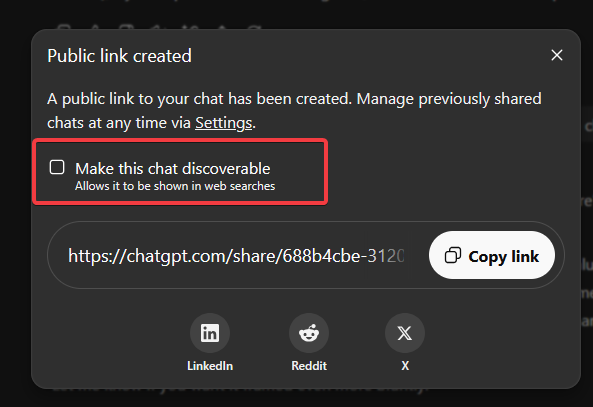On August 1, 2025, OpenAI removed the ChatGPT conversational share option to prevent pages from being indexed on Google.
Dane Stuckey, OpenAI's Chief Information Security Officer, announced the feature's removal on X:
OpenAI canceled the experimental ChatGPT feature after discovering that users' private conversations were appearing in Google search results.
The feature allowed users to make their ChatGPT conversations publicly searchable by selecting the "Make this chat discoverable" button.

Instead of requiring multiple confirmation steps, ChatGPT led to the exposure of sensitive personal information across the internet.
Discovery of the Issue
OpenAI discovered this issue after numerous marketers and SEOs created LinkedIn posts about it, highlighting how the "site:chatgpt.com/share" search parameter allows anyone to find their ChatGPT file potentially.

The results for some people who didn’t know that their chat would be in Google search revealed private content, including job applications with personal details, relationship advice, mental health discussions, and much more.
How the Feature Worked
The sharing option in ChatGPT required explicit user selection and confirmation, but many users were unaware that their conversations would become searchable through Google queries.
The shared content was without usernames but often contained enough detail to identify individuals or reveal sensitive information about their lives.
Impact and Response
This incident highlights challenges facing AI privacy as conversational AI tools become embedded in users' daily routines.
AI conversations tend to be spontaneous and unguarded, making users vulnerable when they misunderstand sharing features.
OpenAI's removal of the feature indicates that explicit user consent may be insufficient when users don't fully understand how their data will be used and exposed.









.png)

.svg)





.png)

.png)


